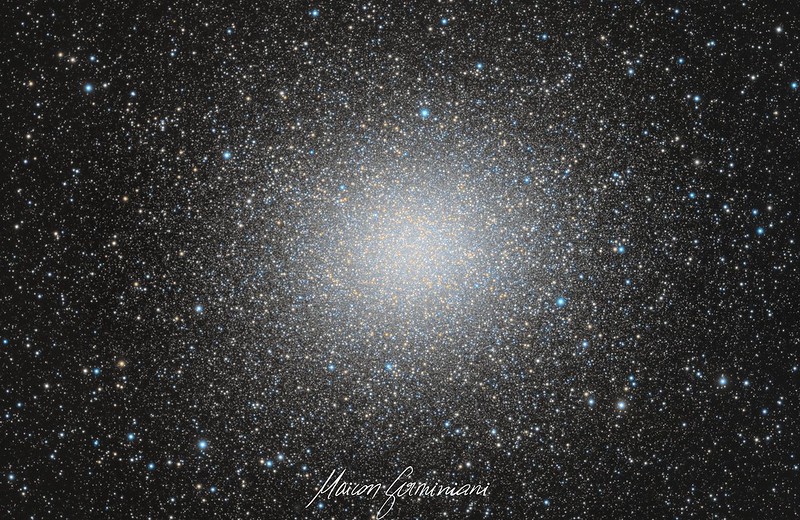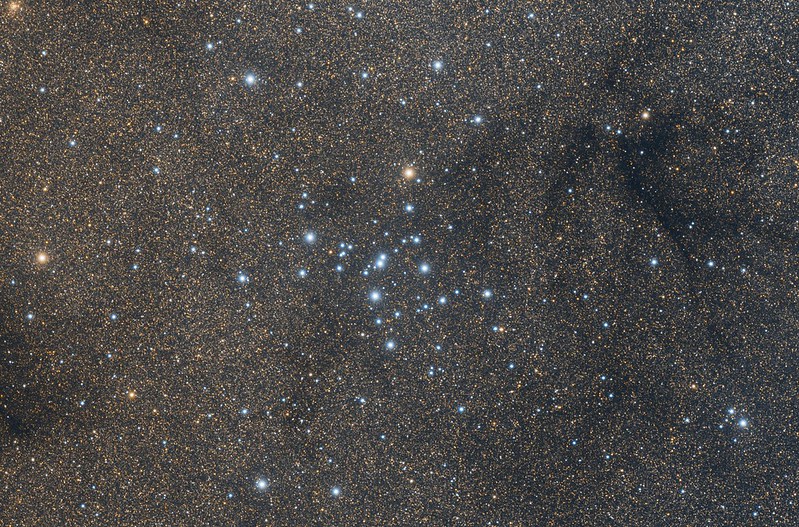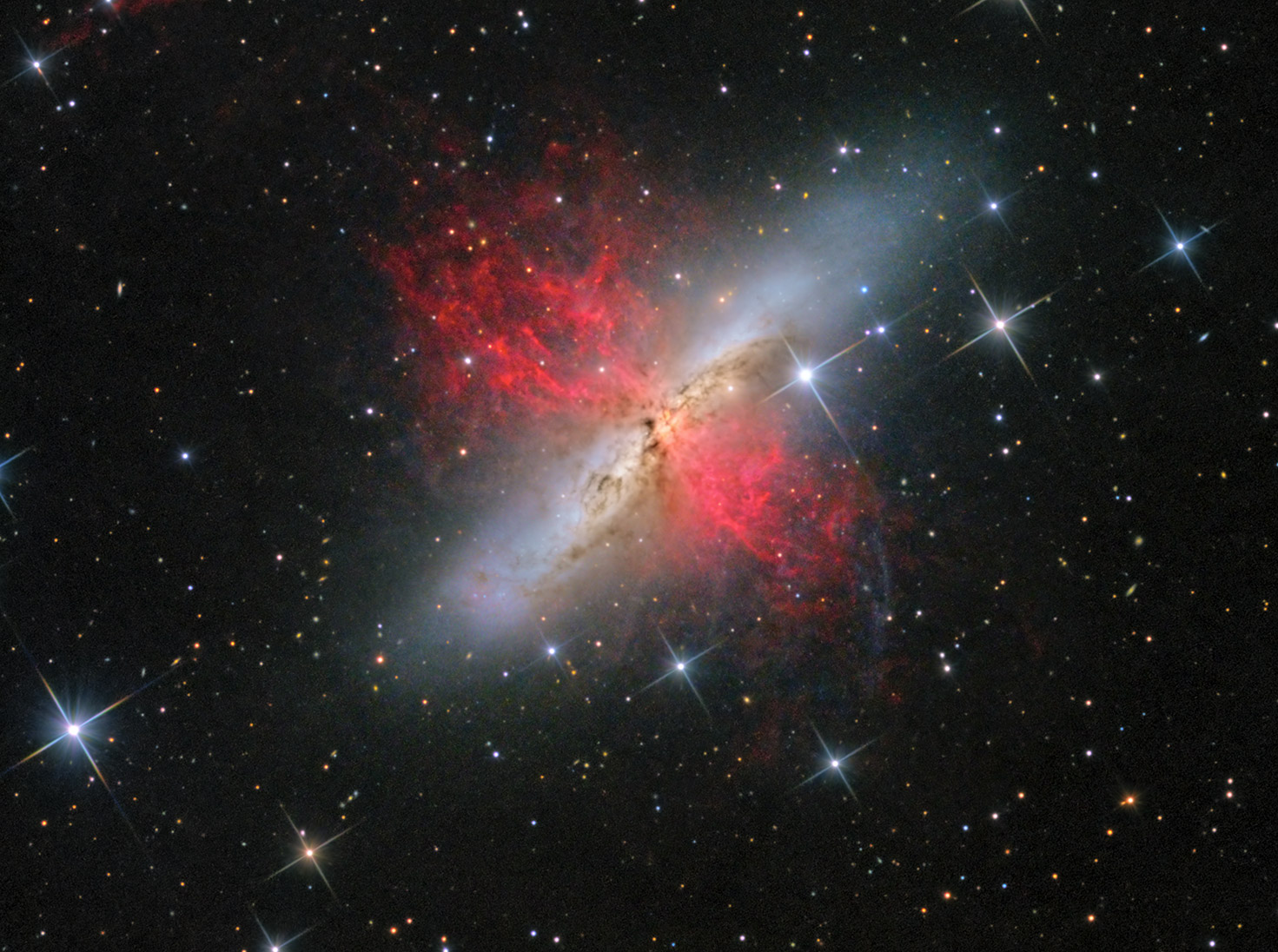Page 1 of 4
Submission: 2019 May
Posted: Sat May 04, 2019 3:00 pm
by bystander
__________________________________________________________________________________________________
Please post your images here.
Please see
this thread before posting images; posting images demonstrates your agreement with
the possible uses for your image.
If hotlinking to an image, please ensure it is under 400K.
Hotlinks to images over 400K slow down the thread too much and will be disabled.
Thank you!
_________________________________________________________________________________________________
<- Previous submissions
Re: Submission: 2019 May
Posted: Sat May 04, 2019 4:51 pm
by topboxman
This is a re-process of Leo "Doublet" (M65 & M66) from April 25, 2019. I found the re-process to be appeared better in term of color.

Higher resolution at:
https://peternagy.smugmug.com/Telescope ... -6LpdjvC/A
RGB + Luminance. 0.84"/pixel image scale.
Astrodon I series Red filter, 12 x 5 minutes, 1x1. 4/24/2019.
Astrodon I series Green filter, 12 x 5 minutes, 1x1. 4/24/2019.
Astrodon I series Blue filter, 12 x 5 minutes, 1x1. 4/24/2019.
Astrodon I series Lum filter, 36x 5 minutes, 1x1. 4/22/2019.
Total 6 hours.
TEC 160FL APO F/7 with TEC Field Flattener, Astro-Physics A-P1100GTO GEM with absolute encoders. QSI660wsg. OAG and Ultrastar autoguider (1.19"/sec), Optec Handy Stepper Motor focuser.
Captured and automated with SGP. Calibration and Post-processed with PixInsight. PHD2 settings: RA Aggressiveness: 60, RA Hysteresis: 10, Max RA/Dec Duration: 2000, Min Move: 0.67 (0.80"), Calibration Steps: 200msec, Auto/Resist Switching, Auto guiding exposure and extreme dithering.
Re: Submission: 2019 May
Posted: Sat May 04, 2019 6:32 pm
by Melina
NGC5253
https://melinasworldblog.wordpress.com/
Copyright: Melina Thévenot
https://melinasworldblog.files.wordpres ... _small.png
Full Resolution Image (26.6 MB)
https://melinasworldblog.files.wordpres ... credit.png
NGC 5253 is the closest Blue Compact Dwarf Galaxy (about 3.3 Mpc distant to the Milky Way) and belongs to a group of galaxies, which includes Centaurus A and M83 (see more:
https://en.wikipedia.org/wiki/Centaurus_A/M83_Group).
I used data from two proposals. Images from circle 21 (
https://archive.stsci.edu/proposal_sear ... t&id=13364) and images from circle 14 (
https://archive.stsci.edu/proposal_sear ... t&id=10765). The images from circle 21 are taken with WFC3/UVIS and ultraviolet filters. I used these as the blue and green part of the image. The images from circle 14 are taken with ACS/WFC and visible light filters. I used these as the red part of the image.
In detail:
wfc3 f275w (blue),
wfc3 f336w (green),
ACS f435w (red),
ACS f555w (red)
Re: Submission: 2019 May
Posted: Sat May 04, 2019 10:20 pm
by Kinch
Re: Submission: 2019 May
Posted: Sun May 05, 2019 3:06 pm
by zema88
SN 2019ehk in M100 [DSLR]
Copyright: Paolo Demaria, Ass. Astrofili Bisalta
Telescope: Skywatcher Newton 200/1000 with Baader RCC
Camera: Canon Eos 450D mod. Baader
Mount: Skywatcher Eq6Pro
Guide: QHY5 with TS OAG 9mm
Location: Castelmagno (Cn, Italy)
21x300s @1600 ISO.
Full resolution:
https://i.postimg.cc/1XKfc3sr/M-100-sn-elab-def.jpg
Best regard,
Paolo Demaria
Ass. Astrofili Bisalta (Cn, Italy)
Re: Submission: 2019 May
Posted: Sun May 05, 2019 5:28 pm
by wellersonlopes
Re: Submission: 2019 May
Posted: Sun May 05, 2019 10:02 pm
by KuriousGeorge
Julian California weather could be a bit "iffy"in April and May. We planned to visit the observatory for 10 days but only stayed 7. Luckily from that 7 we got 3 clear nights with some passing clouds.
Given the unpredictable weather, I had to plan carefully to get something that would be worth publishing. To that end I selected The Eyes (NGC4435 & NGC 4438) as seen here and "The Lost in Space" galaxy (NGC6503) which I'll process next.
I planned to shoot The Eyes from 9 to 1 and NGC6503 from 1 to 5. On the first clear night I got decent L for both (about 3 hours). The second clear night I shot 1 hour of each RGB for both objects. Thinking that may be all I could get this month, I suspected I could get some decent processing, albeit noisy.
Then I got really lucky. 1 more clear night of 8 hours (last night) with less than 2" FWHM seeing on 15-minute subs. I even had several 15-minute subs at 1.4" FWHM. I don't see that too often. I suppose maybe the calm before the storm, which is rolling in today.
I used CCDStack to select the lowest FWHM subs and threw away about 2 hours of L per object as a result (>=2.4" FWHM). Not too bad. I kept all the RGB regardless since I only had an hour in each channel. I usually like to shoot 3 hours in each color channel, so color noise here (i.e., "blotches") is not up to my normal standards.
As always, processing is very minimal. After calibration and stacking in Maxim I used PI for very careful L deconvolution and stretching. I also used PI for RGB gradient removal, Photometric Color Calibration and stretching. Contrast, sharpening, color stretching, noise reduction and combining is all done in PS with very subtle parameters. My goal is to maintain the original natural fidelity from the excellent Planewave optics. This is sometimes difficult to do in PI, at least for me. (-;
I hope you enjoy "The Eyes"...
"...a pair of interacting galaxies about 52 million light-years away in the constellation Virgo. The pair are members of the string of galaxies known as Markarian's Chain. While there is evidence to suggest that the environmental damage to the interstellar medium of NGC 4438 may have been caused by an off-center collision with NGC 4435 millions of years ago, a recent discovery of several filaments of ionized gas link NGC 4438 with the large neighboring elliptical galaxy Messier 86, in addition to a discovery of gas and dust within M86 that may have been stripped from NGC 4438 during a past encounter between the two. Given the high density of galaxies in the center of the Virgo galaxy cluster, it is possible that the three galaxies, NGC 4435, NGC 4438, and M86, have had past interactions."
Re: Submission: 2019 May
Posted: Mon May 06, 2019 5:55 pm
by KuriousGeorge
Lost in Space (NGC 6503). KG Observatory, Julian CA.
"...a spiral galaxy NGC 6503 is in a lonely position, at the edge of a strangely empty patch of space called the Local Void. The Local Void is a stretch of space at least 150 million light-years across that seems completely empty of stars or galaxies. Dark dust lanes snake across the galaxy's bright arms and center, giving it a mottled appearance. Bright red patches of gas can be seen scattered through the galaxy's swirling arms, mixed with blue regions that contain newly forming stars.
Astronomers using Hubble discovered that the emptiness of this region has quite an effect on the space around us — the Milky Way is being strongly pulled away from it by the gentle but relentless tug of other nearby galaxies."
I do see a few more galaxies that may be more lost. (-:
Re: Submission: 2019 May
Posted: Mon May 06, 2019 10:33 pm
by Ann
Both your images are very beautiful, KuriousGeorge. I find the one of "The Eyes" particularly stunning.
Ann
Re: Submission: 2019 May
Posted: Tue May 07, 2019 12:30 pm
by felopaul
Vela
SHORGB :
full size :
http://www.cielboreal.com/galerie/photo99f.jpg
RHaGBo3 :
full size :
http://www.cielboreal.com/galerie/photo99fb.jpg
done with TEC160, Moravian G4-16000 on Paramount MX+ near Actacama Desert in Chile, El Sauce Observatory
http://www.cielaustral.com
Copyright: Team CielAustral with J.C CANONNE, N.OUTTERS, P. BERNHARD, D. CHAPLAIN & L. BOURGON
Re: Submission: 2019 May
Posted: Tue May 07, 2019 5:31 pm
by astrosirius
Abell 1995
The Abell Catalog of Galaxy Clusters was published in 1957 by American Astronomer George Abell. Abell used plates from the Palomar Observatory Sky Survey (POSS) to identify 2,712 galaxy clusters. Of these clusters, 1,351 have been observed by the SDSS Data Release 5.
Copyright: Lluis Romero
Data: HLA- Hubble
Re: Submission: 2019 May
Posted: Wed May 08, 2019 8:36 am
by nvc123
M82, a Ha,RGB image
https://astrob.in/404088/0/
Copyright: Morten la Cour/Niels V. Christensen
Re: Submission: 2019 May
Posted: Wed May 08, 2019 1:02 pm
by felopaul
Dark Tower
SHORGB :
full size :
http://www.cielboreal.com/galerie/photo100f.jpg
RHaGBo3 :
full size :
http://www.cielboreal.com/galerie/photo100fb.jpg
done with TEC160, Moravian G4-16000 on Paramount MX+ near Actacama Desert in Chile, El Sauce Observatory
http://www.cielaustral.com
Copyright: Team CielAustral with J.C CANONNE, N.OUTTERS, P. BERNHARD, D. CHAPLAIN & L. BOURGON
Re: Submission: 2019 May
Posted: Wed May 08, 2019 2:15 pm
by Maicon Germiniani
King of Clusters
[img3]
 Omega Centauri NGC 5139
Omega Centauri NGC 5139 by
maicon germiniani, no Flickr[/img3]
Re: Submission: 2019 May
Posted: Wed May 08, 2019 2:16 pm
by Maicon Germiniani
Open Cluster Messier 7
[img3]
 Messier 7 - Ptolomeu Cluster
Messier 7 - Ptolomeu Cluster by
maicon germiniani, no Flickr[/img3]
Re: Submission: 2019 May
Posted: Wed May 08, 2019 2:21 pm
by Juan Lozano
Re: Submission: 2019 May
Posted: Wed May 08, 2019 6:45 pm
by jose
Hola a todos os dejo esta nebulosa, NGC 2174, espero que os guste;
estos son los datos:
NGC 2174
TOMAS:
Ha: 23 Light de 900 segundos, 23 Darks, 26 Flats y 40 Bias
OIII: 13 Light de 900 segundos, 13 Darks, 26 Flats y 40 Bias
SII: 18 Light de 900 segundos, 18 Darks, 26 Flats y 40 Bias
que hacen un total de 13 horas y media.
TEMPERATURA: -10 GRADOS
TUBO: FSQ 106 ED
CCD: SBIG ST-8300M
MONTURA: CGEM
CCD guiar: QHY5 II
LUGAR: LAS INVIERNAS (GUADALAJARA).
un saludo
jose
Re: Submission: 2019 May
Posted: Wed May 08, 2019 9:11 pm
by mathewbrowne
Saturday night's clear sky forecast coinciding with a new moon meant that it was a perfect night for astrophotography. I headed to the south Pembrokeshire coast of Wales where I bagged quite a few Milky Way images including this one over Elegug Stacks.

Re: Submission: 2019 May
Posted: Thu May 09, 2019 7:48 pm
by G.Chatzifrantzis
M106 Galaxy
Equipment :
OTA : Meade 14 SCT
Mount : Skywatcher EQ8
Camera : Atik 460ex & 460exc
Filters : Idas P2 ,Baader Ha
Guiding : OAG via Lodestar X2
Software : Dss - Pix - Ps
Exposure :
Ha : 1h20min
L : 3h40min
RGB : 1h
Location : Greece
Photographer : George Chatzifrantzis
Orion and Barnard
Posted: Fri May 10, 2019 3:55 pm
by alcarreño
Copyrights: Raul Villaverde Fraile
 The Best Orion
The Best Orion by
Raul Villaverde, en Flickr
Re: Orion and Barnard
Posted: Fri May 10, 2019 4:03 pm
by Ann
That's a great picture! Thanks!

Ann
Milky Way
Posted: Fri May 10, 2019 9:49 pm
by alcarreño
Copyright: Raul Villaverde Fraile
 El Losar de Ocentejo
El Losar de Ocentejo by
Raul Villaverde, en Flickr
Re: Orion and Barnard
Posted: Fri May 10, 2019 9:49 pm
by alcarreño
Ann wrote: ↑Fri May 10, 2019 4:03 pm
That's a great picture! Thanks!

Ann
Thanks¡¡
Re: Submission: 2019 May
Posted: Sun May 12, 2019 6:12 pm
by astrosirius
NGC 3311 -- Brightest galaxy in a Cluster
The dynamically hot stellar halo around NGC 3311: A small cluster-dominated central galaxy
The central region of NGC 3311 is obscured by a dust cloud with an estimated diameter of 1,700 ly (0.53 kpc). It has an amorphous and complex structure and its small size and disturbed morphology suggests that the cloud originated from a merger event with another galaxy that occurred within the past 10 million years. Oddly though, there are no shells or isophote distortions in the outer regions of NGC 3311 that would have been the result of such a recent merger.
The total estimated mass of the dust cloud is 4,600 solar masses (4.6×104 M☉).
In NGC 3311, it has been detected that there is an excess blue population in the central region of the galaxy. The spectrum of the galaxy appears to resemble that of an H II region. This suggests that the excess blue population represents an ongoing formation of young bright stars.
http://astrophotographysirius.com/
Processing: Lluís Romero Ventura
Data: NASA- HLA-ESA
Re: Submission: 2019 May
Posted: Sun May 12, 2019 10:40 pm
by Wah!













